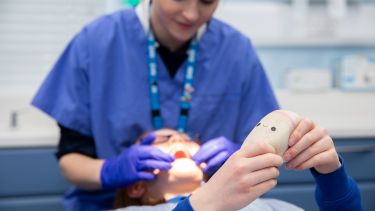Help! I'm scared of the dentist
A lot of children are scared of the dentist. It can appear to be a strange environment full of unusual tools and unfamiliar smells. Children who are scared of the dentist feel worried and upset and may do anything to avoid going for treatment.

For some, this can result in a mouthful of untreated, decayed teeth. This can be difficult for the parents to cope with and children often end up having their treatment carried out using sedation or having a general anaesthetic in hospital. But this approach doesn’t help them feel less scared about future dental treatment and it’s particularly costly for the NHS.
Professor Zoe Marshman, from the University of Sheffield’s School of Clinical Dentistry, and her team knew there must be a better way to help children, their parents/carers and to make better use of NHS resources. “In Sheffield alone, every week 30-40 children go to hospital and have a general anaesthetic for dental treatment either because they are very young or because they are too afraid to have it done at the dental surgery. Without help to overcome their fears, these children will remain scared of dental treatment and have poorer dental health long-term as a result,” explains Zoe.
Cognitive Behavioural Therapy (CBT) provides that solution. When it comes to dealing with fears, everything from clowns to spiders, CBT can help people manage their problems. It helps people understand how their fears make them feel, think and behave so they can develop their own solutions to overcome their fears.
Using the principles of CBT, Zoe and her team developed resources called, ‘Your teeth you are in control’, for children aged 9 to 16 years old with dental anxiety. The resources, designed with the help of children and parents, are for children to complete together with their dentist and parent/carer. They aim to help children feel comfortable talking about their worries, build trust with the dental team and, most importantly, put children in control. The resources encourage children to write a ‘message to their dentist’ explaining what they want to happen (and don’t want to happen!).
The guide can be used by children to dictate what they think will help them cope with their anxieties based on a list of activities. For some, this means choosing music to listen to during the treatment, for others, it’s squeezing a stress ball or having small rewards for making progress with treatment.
When used over a series of visits these resources have been shown to reduce fear of the dentist and the number of children who need to go to hospital for a general anaesthetic or sedation. Children feel happier about going and miss or cancel less of their appointments.
When used over a series of visits these resources have been shown to reduce fear of the dentist and the number of children who need to go to hospital for a general anaesthetic or sedation. Children feel happier about going and miss or cancel less of their appointments.
Professor Zoe Marshman
The University of Sheffield School of Clinical Dentistry
‘Your teeth you are in control’ is currently being rolled out across the NHS, to help children with dental anxiety around the country. But it’s also been translated into six other languages, including Mandarin and Arabic, helping children across the world.
By giving children control during dental procedures, ‘Your teeth you are in control’ is transforming children’s experiences of dental treatment now and in the future.
Further information
Social media
Relevant publications
Development and Testing of a Cognitive Behavioral Therapy Resource for Children's Dental Anxiety
Children's experiences following a CBT intervention to reduce dental anxiety: one year on.




